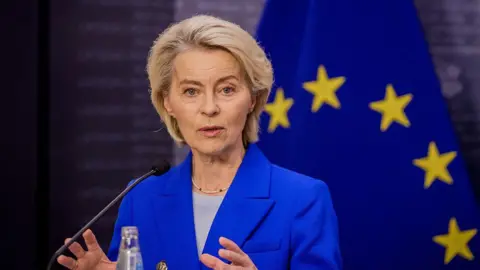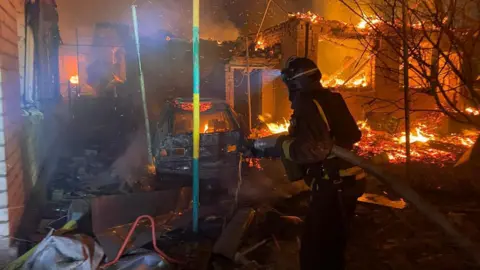Ukraine has dramatically increased the number of attacks launched against Russian oil refineries in recent months, sparking fuel shortages and price rises in some parts of the country, BBC Verify and BBC Russian have found.
Drone strikes on refineries - some deep inside Russia - soared in August and remained high in September, an analysis of Russian media reports and verified footage showed.
Some 21 of the country's 38 large refineries - where crude oil is converted into usable fuel like petrol and diesel - have been hit since January, with successful attacks already 48% higher than the whole of 2024.
Ordinary Russians appear to be feeling the impact of the strikes, with verified videos showing long queues at petrol stations. Some garages have suspended operations to 'wait out the crisis' rather than work at a loss, one manager told Russian media.
Ukraine's security service (SBU) did not respond to a request for comment. But President Volodymyr Zelensky has indicated that damaging Russia's oil industry is pivotal in exerting pressure for negotiations.
'The most effective sanctions – the ones that work the fastest – are the fires at Russia's oil refineries, its terminals, oil depots,' the Ukrainian leader said in a September address.
Our analysis shows reported attacks reached a record level in August, with 14 refineries targeted by Ukrainian drones, and eight in September.
In late September, the SBU successfully struck the Gazprom Neftekhim Salavat oil refinery in the Bashkortostan region twice.
Kyiv has also attacked some of Russia's most lucrative facilities, including a refinery near Volgograd targeted six times this year. A drone strike at the large Ryazan plant near Moscow has occurred five times since January.
Ukrainian strikes are aimed at large refineries essential for civilian supplies as well as those supplying military operations. An exiled opposition politician highlighted the role some refineries play in military logistics.
Justin Crump, a ex-British army officer, noted that targeting Russia's oil industry has become a core aspect of Ukraine's military strategy.
The extent of the strikes' impact on petrol and diesel output is difficult to ascertain, as Russia has classified production statistics since May amid an earlier wave of attacks. However, at least 10 oil refineries have had to suspend operations since August due to these strikes.
Evidence suggests the attacks are affecting civilian life, with reports of fuel shortages leading to long queues in various regions of Russia and even rationing in occupied Crimea.
As petrol prices soar, Russian media has begun hinting that drone strikes are contributing to the fuel supply shortfall. Officials claim the situation is under control; however, some experts argue that the measures taken may not adequately address the crisis.
Overall, experts believe the strikes are gradually undermining Moscow's capacity to sustain its war effort.




















